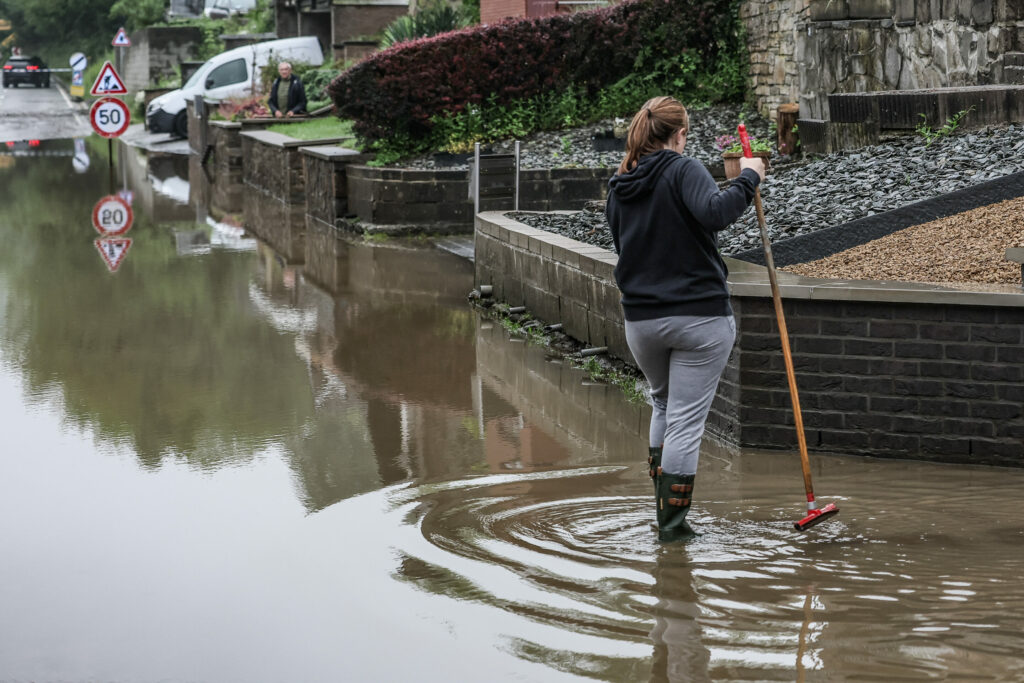As the COP29 climate change conference takes place this week in Azerbaijan, a European Investment Bank (EIB) survey has revealed that just half of Belgians believe climate adaptation should be prioritised.
Ahead of the UN Climate Change Conference (COP29) in Baku (Azerbaijan), which began on Monday, the EU's Climate Service Copernicus said last week it is "virtually certain" that 2024 will become the hottest year on record, surpassing the milestone set just last year. Global average temperatures are rising steadily year-on-year, influenced heavily by human activity and greenhouse gas emissions.
Against this backdrop, the EIB released the seventh edition of its annual climate survey, questioning EU citizens about climate adaptation, financing and how climate change will impact their daily lives.
Second-biggest challenge
As the world becomes more accustomed to extreme weather events, Belgium too has experienced exceptional incidents, from the fatal floods in 2021 to thunderstorms wreaking havoc in Brussels and fast-rising temperatures. The vast majority of respondents (94%) therefore indicated that climate adaptation is "important". Many agree that climate change is the second-biggest challenge facing Belgium, after the rising cost of living.
Improved infrastructure, making cities cooler and introducing more plants that are resistant to climate change are among the most prominently supported measures. The need for climate action is also reinforced by personal experience: almost three in four people in Belgium say they have experienced extreme weather at least once in the past five years, while 60% experienced at least one direct consequence.
However, only half say this adaptation needs to be prioritised. Meanwhile, on an individual basis, Belgians are well aware of the need to adapt, the survey showed. Around two in three (65%) recognise that they will have to adapt their lifestyle due to climate change.
One in three think they will have to move to a less climate-vulnerable place – either in Belgium or abroad – to avoid floods, forest fires or other extreme weather events. One in five believe they will have to move to a cooler region or country.
Across the EU, people living in the Mediterranean region (Malta, Cyprus, Greece and Italy) are most likely to expect to have to adapt their lifestyles.
Climate costs
A recent European Environment Agency (EEA) report showed that Europe is currently the fastest-warming continent. As global temperatures rise, the number of extreme weather events is also expected to increase.
The costs of climate change are expected to further weigh on the nation's budgets. A report outlining the socio-economic impact of climate change in Belgium showed that costs associated with extreme heat, drought and floods will reach almost €9.5 billion per year – about 2% of the country's GDP. Meanwhile, climate experts have stressed that for every euro invested in climate action, governments could save between €1.50 and €3.90 in climate damage.
More than four in five (81%) of Belgian respondents agree that investing in adaptations now will prevent higher costs in the future. Just over a third believe companies and sectors that contribute the most to climate change should pay for these adaptations, while a quarter think everyone should contribute equally. One in five think only the richest should cover this cost through higher taxes.
Related News
- Climate financing will be key priority for COP29, says top Belgian delegate
- Trump gets ready to torch the climate
Many key EU politicians, including the French and German leaders, as well as Commission President Ursula von der Leyen, are not attending COP29 due to domestic political challenges.
Outgoing Belgian Prime Minister Alexander De Croo (Open VLD) will be travelling to Baku with a Belgian delegation, led by Ulrik Lenaerts, the deputy director for environment, climate policies and co-operation within Belgium's Ministry of Foreign Affairs. He told The Brussels Times that the success of this year's conference hinges on the abilities of parties to reach an agreement on climate financing.
Belgium will be taking the lead for the EU on a number of topics, such as mitigation, the just transition, the market mechanism and finance issues. It will also promote more national priorities, such as the energy transition and offshore wind.

